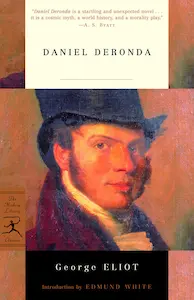Daniel Deronda - Summary
George Eliot

Introduction
“Daniel Deronda” is a captivating novel written by George Eliot, a prominent Victorian author. Published in 1876, it explores themes of love, identity, and social class in 19th-century England. Eliot’s masterful storytelling and rich character development make this novel a timeless piece of literature. In this book summary, we will delve into the plot, analyze key characters, and discuss the significant themes that make “Daniel Deronda” a compelling read.
Plot Overview
Set in England during the mid-19th century, “Daniel Deronda” tells the parallel stories of two main characters: Gwendolen Harleth and Daniel Deronda. Gwendolen, a beautiful and headstrong young woman, is forced to marry for financial security after her family’s fortune dwindles. However, she soon finds herself trapped in a loveless marriage with the wealthy but cruel Henleigh Grandcourt.
Meanwhile, Daniel Deronda, a compassionate and introspective young man, embarks on a journey of self-discovery. Raised as the ward of Sir Hugo Mallinger, Daniel is unsure of his true parentage. As he becomes involved with a Jewish community in London, he begins to question his own identity and grapples with his place in society.
The paths of Gwendolen and Daniel eventually cross, leading to a complex and emotional relationship. Gwendolen, trapped in her unhappy marriage, finds solace and understanding in Daniel’s presence. The novel explores their connection, as well as the societal expectations and obstacles that stand in their way.
Gwendolen Harleth: A Complex Protagonist
Gwendolen Harleth is a complex and multi-dimensional character who undergoes significant growth throughout the novel. At the beginning, she is portrayed as a self-centered and ambitious young woman, driven by a desire for wealth and social status. However, as the story progresses, Gwendolen’s experiences and hardships force her to confront her own flaws and reevaluate her priorities.
Eliot skillfully portrays Gwendolen’s internal struggles, allowing readers to empathize with her despite her initial flaws. Through Gwendolen’s character development, Eliot explores themes of personal growth, the consequences of one’s choices, and the power of redemption.
Daniel Deronda: A Search for Identity
Daniel Deronda, the novel’s other protagonist, embarks on a profound journey of self-discovery. Raised in English aristocracy, Daniel’s encounter with the Jewish community in London opens his eyes to a different culture and way of life. This experience prompts him to question his own identity and search for his true heritage.
Daniel’s exploration of his Jewish roots not only adds depth to his character but also sheds light on the prejudices and discrimination faced by the Jewish community during that time. Eliot uses Daniel’s story to challenge societal norms and advocate for acceptance and understanding.
Themes of Love and Society
Love, in its various forms, is a central theme in “Daniel Deronda.” The novel explores both romantic and platonic love, highlighting the complexities and challenges that come with these relationships. Gwendolen and Daniel’s connection, for instance, transcends societal expectations and conventional norms, leading them to question their own desires and responsibilities.
Eliot also delves into the impact of society on individuals, particularly in relation to class and gender. The novel exposes the limitations and constraints placed upon women like Gwendolen, who are expected to prioritize wealth and social status over personal happiness. Through her characters, Eliot criticizes the rigid social structure of Victorian England and advocates for greater freedom and agency for women.
Conclusion
“Daniel Deronda” is a masterful work by George Eliot that delves into the complexities of love, identity, and societal expectations. Through the parallel stories of Gwendolen Harleth and Daniel Deronda, Eliot weaves a captivating narrative that explores the human condition and challenges the norms of Victorian society.
The novel’s rich character development, thought-provoking themes, and engaging storytelling make it a timeless piece of literature. “Daniel Deronda” continues to captivate readers, offering profound insights into the human experience and the power of self-discovery.